 | TODAY IN SCIENCE HISTORY NEWSLETTER - 20 APRIL |
| Feature for Today |
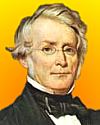 On 20 Apr 1798, Sir William Edmond Logan, one of Canada's great scientists, was born. On 20 Apr 1798, Sir William Edmond Logan, one of Canada's great scientists, was born.When he founded the Geological Survey of Canada, the country's geology was virtually unknown. He served as its director (1842-69) and produced the monumental Report on the Geology of Canada (1863), recording 20 years of his research and fieldwork. In our era, geologists ride over any landscape in 4-wheel-drive trucks, and record their data on laptop computers. Not so for this pioneer geologist! Read this Obituary for William E. Logan and let your mind picture a return to his time when "From early dawn till dusk he paced or paddled, and yet his work was not finished, for while his Indians—often his sole companions—smoked their pipes round the evening fire, he wrote his notes and plotted the day's measurements." |
| Book of the Day | |
| |
| Quotations for Today | |
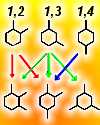 | "The dogma of the impossibility of determining the atomic constitution of substances, which until recently was advocated with such fervor by the most able chemists, is beginning to be abandoned and forgotten; and one can predict that the day is not far in the future when a sufficient collection of facts will permit determination of the internal architecture of molecules. A series of experiments directed toward such a goal is the object of this paper." |
 | "Questions that pertain to the foundations of mathematics, although treated by many in recent times, still lack a satisfactory solution. Ambiguity of language is philosophy's main source of problems. That is why it is of the utmost importance to examine attentively the very words we use." |
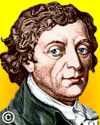 | "Everyone now agrees that a physics lacking all connection with mathematics ... would only be an historical amusement, fitter for entertaining the idle than for occupying the mind of a philosopher." |
| QUIZ | |
| Before you look at today's web page, see if you can answer some of these questions about the events that happened on this day. Some of the names are very familiar. Others will likely stump you. Tickle your curiosity with these questions, then check your answers on today's web page. | |
| Births | |
 |  Gerald S. Hawkins, born 20 Apr 1928, was a British astronomer who identified an ancient location in England to be a prehistoric astronomical observatory, built thousand of years ago. He identified 165 key points in the complex and found that many of them very strongly correlated with the rising and setting positions of the sun and moon. He used a computer to show that there existed at a pattern of alignments with twelve major lunar and solar events. Gerald S. Hawkins, born 20 Apr 1928, was a British astronomer who identified an ancient location in England to be a prehistoric astronomical observatory, built thousand of years ago. He identified 165 key points in the complex and found that many of them very strongly correlated with the rising and setting positions of the sun and moon. He used a computer to show that there existed at a pattern of alignments with twelve major lunar and solar events. What site did he identify as an ancient astronomical observatory? What site did he identify as an ancient astronomical observatory? |
| Deaths | |
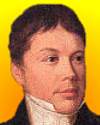 |  Ignatz Venetz (1788-1859) was Swiss geologist who was one of the first to propose that vast glaciers once covered a substantial portion of the earth's surface. Ignatz Venetz (1788-1859) was Swiss geologist who was one of the first to propose that vast glaciers once covered a substantial portion of the earth's surface. What evidence did he use to support this claim? What evidence did he use to support this claim? |
 |  Franz Karl Achard (1753-1821) was a German chemist who invented a process for the large-scale extraction of table sugar (sucrose) from a certain plant, and in 1801, opened the first factory to process, in Silesia (now Poland). At first, though simple, the method was costly, due to the amount of fuel used. Franz Karl Achard (1753-1821) was a German chemist who invented a process for the large-scale extraction of table sugar (sucrose) from a certain plant, and in 1801, opened the first factory to process, in Silesia (now Poland). At first, though simple, the method was costly, due to the amount of fuel used. What plant was the source of sugar in his process? What plant was the source of sugar in his process? |
| Events | |
 |  On 20 Apr of a certain year, the first picturephone transcontinental call was made between New York City and Anaheim, California. The device consisted of a telephone handset and a small, matching TV. It allowed telephone users to see each other in fuzzy video images as they carried on a conversation. On 20 Apr of a certain year, the first picturephone transcontinental call was made between New York City and Anaheim, California. The device consisted of a telephone handset and a small, matching TV. It allowed telephone users to see each other in fuzzy video images as they carried on a conversation.  In which decade was this first transcontinental picturephone call made? In which decade was this first transcontinental picturephone call made? |
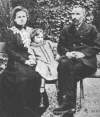 |  On 20 Apr 1902, Marie and Pierre Curie isolated one gram of radium, the first sample of the radioactive element. They had refined it from a quantity pitchblende ore. On 20 Apr 1902, Marie and Pierre Curie isolated one gram of radium, the first sample of the radioactive element. They had refined it from a quantity pitchblende ore.  Was the quantity of ore they processed to isolate this first gram of radium: (a) 8-lb (b) 80-lb (c) 800-lb (d) 8000-lb (e) 8 tons? Was the quantity of ore they processed to isolate this first gram of radium: (a) 8-lb (b) 80-lb (c) 800-lb (d) 8000-lb (e) 8 tons? |
 |  On 20 Apr 1862, the first test of a process to treat liquids to prevent decay or fermentation was concluded as the inventor opened sealed jars at a meeting of the French Academy of Sciences. They containing dog's blood and urine that had been maintained at an elevated temperature of 30ºC and sealed on the previous month on 3 Mar. This suggested the possibility of heating foods sufficiently to kill germs without significantly altering their chemical composition. The process was applied to beer to lengthen its storage life without constant refrigeration. On 20 Apr 1862, the first test of a process to treat liquids to prevent decay or fermentation was concluded as the inventor opened sealed jars at a meeting of the French Academy of Sciences. They containing dog's blood and urine that had been maintained at an elevated temperature of 30ºC and sealed on the previous month on 3 Mar. This suggested the possibility of heating foods sufficiently to kill germs without significantly altering their chemical composition. The process was applied to beer to lengthen its storage life without constant refrigeration.  Named after its inventor, what word is now used for this process? Named after its inventor, what word is now used for this process? |
| Answers |
When you have your answers ready to all the questions above, you'll find all the information to check them, and more, on the April 20 web page of Today in Science History. Or, try this link first for just the brief answers. Fast answers for the previous newsletter for April 19: The actinides; Norwegian; ...by Means of Natural Selection; the decade including the year 1943; Pierre Curie. |
| Feedback |
 If you enjoy this newsletter, the website, or wish to offer encouragement or ideas, please send feedback by using your mail reader Reply button. If you enjoy this newsletter, the website, or wish to offer encouragement or ideas, please send feedback by using your mail reader Reply button. |
--
If you do not want to receive any more newsletters, this link
To update your preferences and to unsubscribe visit this link
If you do not want to receive any more newsletters, this link
To update your preferences and to unsubscribe visit this link
! !



Δεν υπάρχουν σχόλια:
Δημοσίευση σχολίου